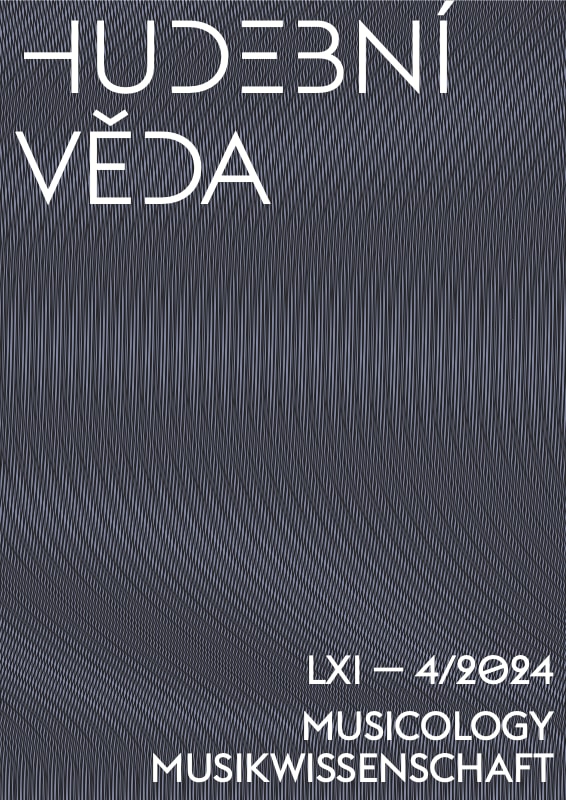Článek | Article
Autor:
Hana Vlhová-Wörner
Název:
The Last Pages of the Jistebnice Kancionál. The Repertory of the “Additamenta” Section (ff. 111r–132v)
Variantní název:
Poslední strany Jistebnického kancionálu. Repertoár oddílu „Additamenta“ (ff. 111r–132v)
Zdrojový dokument:
Hudební věda LXI (2024), č. 4, s. 466–489.
DOI:
https://doi.org/10.54759/MUSICOLOGY-2024-0401
Trvalý odkaz:
https://kramerius.lib.cas.cz/uuid/uuid:e00e206b-1f58-4dbb-8d39-a1f10e461b0c
English summary:
In modern research on the Jistebnice Kancionál, the last ca. 20 folios of the manuscript, which includes an incoherent repertory selection, has always remained somewhat ignored. Some chants are contemporary supplements to the repertory found in previous sections, while others, presumably added later, have only little in common with the main content of the manuscript. A closer look reveals that most of these additions can be divided into smaller repertory groups. Around a third of these additions were written by one of the main scribes of the Jistebnice Kancionál, who clearly focused here on the repertory for Holy Week: lamentations, office chants, and prayers. Two other scribes also focused on particular genres, including psalm translations and Czech spiritual songs for Christmas. The two largest pieces, a vernacular Passion of Christ according to Matthew and a vernacular translation of the Athanasian Creed, reflect the initiatives of the Hussite reformers in their advocation for vernacular Mass readings. The last five folios are entirely different in content, providing Latin monophonic and polyphonic repertory. The detailed repertory analysis in this article aims to introduce the Jistebnice Kancionál from a new angle: as a manuscript that was still in use several decades after the completion of its main corpus and which reflected the current practice of both the Latin and vernacular liturgies.
České resumé:
V moderním výzkumu o Jistebnickém kancionálu zůstala vždy poněkud stranou pozornosti závěrečná část rukopisu (ca. 20 folií), která obsahuje nesourodý výběr zpěvů a textů. Některé zpěvy představují současné doplňky k repertoáru zaznamenaném v předchozích částech, jiné, zapsané do rukopisu mnohem později, pak již mají s hlavním obsahem rukopisu jen málo společného. Bližší pohled na tyto strany ukazuje, že lze většinu těchto doplňků rozdělit do menších repertoárových skupin. Přibližně třetinu doplňků zapsal jeden z hlavních písařů Jistebnického kancionálu, který se v této části zaměřil především na velikonoční liturgický repertoár: lamentace, zpěvy hodinkového oficia a modlitby. Dva další písaři se zaměřili také na specifické žánry, na překlady žalmů a na vánoční písně. Dva nejrozsáhlejší zpěvy v této části, české pašije podle evangelia svatého Matouše a český překlad vyznání víry, pak odrážejí iniciativy husitských reformátorů, kteří propagovali čtení epištoly a evangelia ve mši v mateřském jazyce. Zcela odlišného charakteru je pak repertoár zapsaný na posledních pěti foliích, která zahrnují jednohlasý a vícehlasý hudební repertoár s latinskými texty. Cílem této studie, která se opírá o podrobný rozbor repertoáru, je představit Jistebnický kancionál z nového úhlu pohledu: jako rukopis, který se používal ještě několik desetiletí po dokončení jeho hlavní části a cenný svědek latinské a české liturgické praxe v době pohusitské.
Keywords:
Jistebnice Kancionál; Hussite liturgy; Czech spiritual songs; psalm translations; lamentations; mass ordinary chants; Athanasian Creed
Klíčová slova:
Jistebnický kancionál; česká husitská liturgie; české duchovní písně; překlady písně; lamentace; zpěvy mešního ordinaria; Athanasiovo vyznání víry

